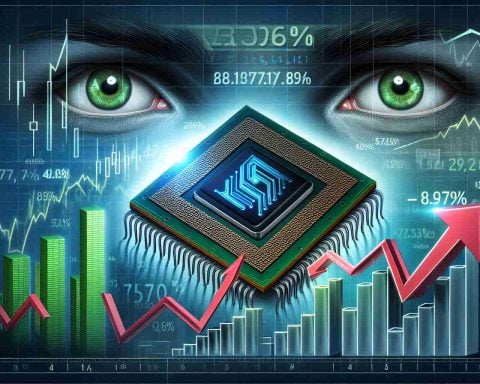- AMD’s Ryzen 7000 series chipsets promise enhanced gaming performance and energy efficiency, driving significant market interest.
- The integration of AI in gaming by AMD is creating immersive experiences, offering a competitive advantage and transforming the industry’s landscape.
- AMD’s advancements extend beyond gaming, impacting sectors like healthcare and education with energy-efficient solutions, though raising ecological concerns related to rare material usage.
- Emerging gaming technologies may widen socio-economic gaps, highlighting the need for inclusive infrastructure development.
- The article emphasizes the importance of leveraging technological innovations responsibly to ensure broad societal benefits.
The recent surge in AMD’s share price marks an exhilarating chapter for gamers and industries worldwide. Their bold investments in cutting-edge chipsets and revolutionary AI-driven technologies are reshaping gaming and impacting broader sectors.
Unleashing the Future of Gaming: At the heart of AMD’s meteoric rise is the groundbreaking Ryzen 7000 series. These advanced chip designs promise to supercharge gamers’ experiences with enhanced performance and energy efficiency, setting the stage for a new era of gaming supremacy. Investors are banking on these chipsets to dominate the market, ushering in a wave of high-powered, cost-effective gaming systems.
The Advent of AI-Powered Entertainment: AMD’s strategic integration of AI into gaming frameworks is crafting more immersive, responsive environments, captivating investors and gamers alike. This leap into AI-enhanced gaming represents a significant competitive edge for AMD, poised to redefine the landscape.
Beyond the Gaming Universe: AMD’s technological strides transcend gaming, offering profound implications for industries such as healthcare and education. Enhanced energy-efficient chips promise to revolutionize global energy consumption, particularly in power-hungry data centers, potentially slashing costs and reducing carbon footprints. However, the required rare materials for these chipsets raise ecological concerns.
Bridging Socio-economic Gaps: While cutting-edge gaming technology holds vast potential, it risks widening socio-economic divides. Communities without necessary infrastructure may lag behind, urging a collective approach to inclusive technological progreso.
The sweeping impact of AMD’s innovations challenges societies to harness technological advancements responsibly. As we race forward with new tech, how can we ensure it benefits all? For a deeper dive into AMD’s AI journey, explore their official resources and unlock the potential of an evolving digital world.
AMD’s Game-Changing Innovations: A New Era of Gaming and Beyond
How will AMD’s Ryzen 7000 Series Impact the Gaming Market?
With the introduction of the Ryzen 7000 series, AMD is set to transform the gaming landscape. These chipsets offer enhanced performance and energy efficiency, making high-powered, cost-effective gaming systems more accessible. The market anticipates a shift towards devices capable of delivering seamless gaming experiences while minimizing power usage. As a result, we expect the demand for gaming hardware powered by AMD’s chips to skyrocket, intensifying competition and innovation within the industry.
For more information, visit AMD.
What Are the Pros and Cons of AMD’s AI-Driven Gaming Frameworks?
Pros:
– Immersive Experiences: AI integration in gaming offers more realistic, dynamic environments that adapt to player actions in real-time.
– Competitive Advantage: AMD stands out for its innovative approach, likely capturing a larger market share in the gaming industry.
– Cross-Industry Benefits: Besides gaming, AI technologies developed by AMD may benefit sectors such as healthcare and education by enhancing data processing and reducing energy requirements.
Cons:
– Resource Concerns: The production of AI-empowered chipsets requires rare materials, posing ecological and sustainability challenges.
– Accessibility Issues: High-tech advancements might not be uniformly accessible worldwide, potentially widening socio-economic gaps.
How is AMD Contributing to Sustainability and Energy Efficiency?
AMD’s technological advancements focus on producing energy-efficient chips that significantly reduce energy consumption. This is particularly beneficial for power-intensive data centers, leading to lower operational costs and a reduced carbon footprint. However, the sustainability of these chips depends on addressing the ecological impacts of sourcing rare materials and ensuring the conscientious disposal of electronic waste.
To explore AMD’s sustainability initiatives, check out AMD’s official website.
By delving into these pivotal developments, we gain insight into how AMD’s innovations can drive a more sustainable and inclusive future, both within the gaming sector and beyond.



















